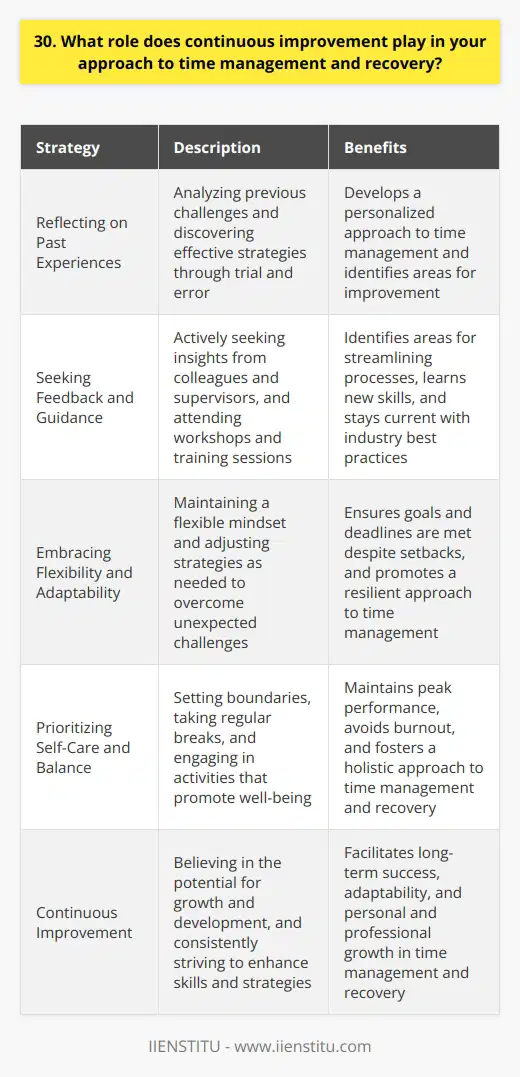
Historically, the work environment has been a landscape of constant change. Despite our best efforts to plan and prepare, unforeseen challenges arise, knocking us off course and persistently rocking our boats. One area where these challenges often surface is in time management.
Navigating the Waves of Time Management Failures
In my early days as a project manager, I vividly recall a time when my meticulously crafted schedule fell apart. I had planned every detail, left no stone unturned—or so I thought. But life, as it often does, had other plans. A key supplier went bankrupt, and our entire timeline was thrown into disarray. It was a lesson in humility and adaptability that I carry with me to this day.
The Purpose Behind the Question
So, when you're sitting in an interview and the question pops up:
"How have you recovered a failed time management plan?"
It's not a curveball meant to unsettle you. Instead, it's a strategic inquiry into your resilience, adaptability, and problem-solving skills. Interviewers want to know:
Can you adapt when things go awry?
Do you have the resilience to bounce back from setbacks?
How To Answer İnterview Question Describe A Failed Digital Marketing Attempt Effectively
Interview Question How Often Do You Use Problem Solving İn Job İnterviews
How proficient are you in risk management?
They're not looking for perfection. In fact, acknowledging that failures happen—and demonstrating your ability to recover—is far more valuable.
Universality Across Career Levels
Whether you're just starting out or you're a seasoned professional, this question is relevant. Time management is a universal skill, essential across all professions. From project leaders to junior staff, everyone faces moments when plans don't unfold as expected. Thus, this question often surfaces in interviews for:
1- Entry-level positions
2- Mid-career roles
3- Senior leadership positions
Crafting Your Response: What Interviewers Expect
When responding, honesty is paramount. Denying that you've ever experienced a time management failure is not only unrealistic but also a missed opportunity to showcase your growth. Instead:
Tell a story: Share a specific incident where your time management plan didn't work out.
Focus on your actions: Highlight how you responded to the setback.
Balancing Urgency And İmportance İn Time Management İnterview Question
Mastering Problem-solving Questions İn Job İnterviews Strategies
Emphasize the outcome: Discuss the positive results of your recovery efforts.
Reflect on lessons learned: Show how the experience has improved your future planning.
An Exemplary Response
Let me share an example from my own experience:
"At my previous job at ABC Corp, we were launching a new product, and I was in charge of the marketing campaign. I had developed a detailed timeline, but unforeseen regulatory changes caused significant delays. Recognizing the issue, I immediately gathered my team to re-evaluate our strategy. We identified non-critical tasks that could be postponed and allocated extra resources to critical areas. We also reached out to stakeholders to manage expectations. In the end, we launched the product just two weeks behind schedule, which was a significant recovery given the circumstances. This taught me the importance of flexibility and proactive communication in time management."
This response demonstrates:
Problem-solving skills
Leadership and teamwork
Adaptability and resilience
Ability to deliver under pressure
Strategies for Recovering from a Failed Time Management Plan
Recovering from a time management failure isn't just about putting out fires; it's about building a stronger structure to prevent future blazes. Here are some strategies that have proven effective:
1- Conduct a Root Cause Analysis: Identify what went wrong. Was it poor estimation, unforeseen events, or miscommunication?
2- Re-Prioritize Tasks: Focus on what's most critical. Use tools like the Eisenhower Matrix to distinguish between urgent and important tasks.
3- Adjust Your Plan: Flexibility is key. Reallocate resources, adjust deadlines, and communicate changes promptly.
4- Implement Buffer Times: Allow for contingencies in your future planning to accommodate unexpected delays.
5- Reflect and Learn: After resolving the issue, take time to reflect on the lessons learned to improve future time management.
Can you describe the measures you took to salvage a time management plan that didn't work out?
What steps did you follow to recuperate after your time management plan failed?
How did you bounce back when your time management plan didn't succeed?
What methods did you employ to get back on track when your time management plan tanked?
Can you recall a time management plan failure and how you managed to recover from it?
How did you regain control over your schedule when your initial time management plan failed?
What strategy did you adopt to redeem a collapsed time management plan?
What was your process for moving forward after a failed time management plan?
Can you tell us about a time when a time management plan didn't work as expected and your actions to correct it?
How did you manage to reconstruct a failed time management plan successfully?
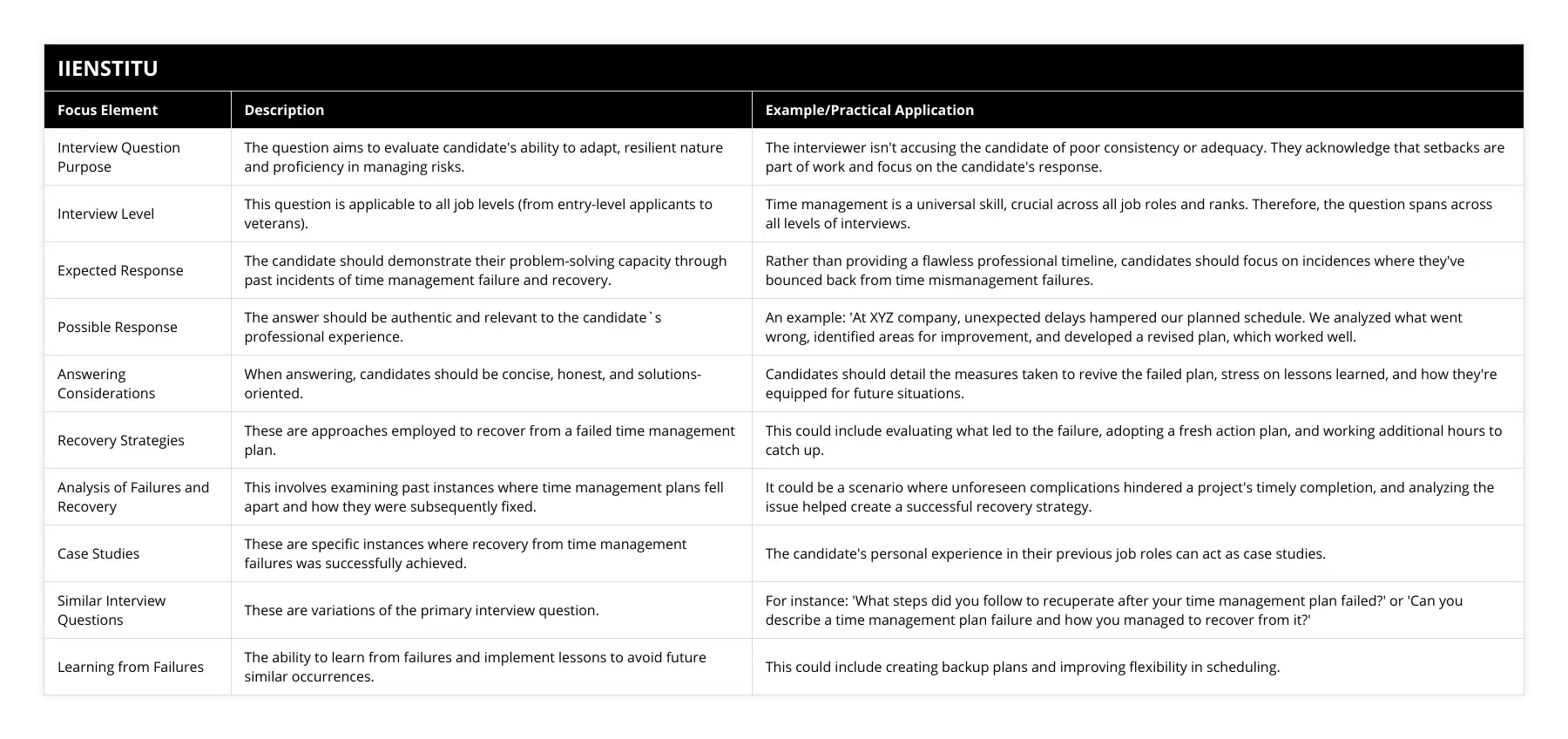
Analyzing Time Management Failures: A Deeper Dive
Understanding the why behind a failure is crucial. According to Dr. Stephen R. Covey in The 7 Habits of Highly Effective People, effective management involves "putting first things first." Failing to prioritize can lead to time management pitfalls.
Common Causes of Time Management Failures
Overcommitment: Taking on more than you can handle.
Poor Prioritization: Not distinguishing between urgent and important tasks.
Lack of Delegation: Trying to do everything yourself.
Distractions and Interruptions: Allowing constant interruptions to derail your plan.
Underestimating Task Duration: Not allocating sufficient time for tasks.
By recognizing these common pitfalls, you can develop strategies to avoid them.
Learning from Others: Case Studies
Case Study 1: The Apollo 13 Mission
In the harrowing Apollo 13 mission, the initial time management plan was rendered obsolete after an oxygen tank explosion. The mission control team had to reconstruct their timeline in real-time, prioritizing the astronauts' safe return over the original mission objectives. Their ability to adapt under extreme pressure is a testament to effective recovery in time management.
Reference: Kranz, Gene. Failure Is Not an Option: Mission Control From Mercury to Apollo 13 and Beyond. Simon & Schuster, 2000.
Case Study 2: Toyota's Supply Chain Recovery
Toyota faced significant disruptions following the 2011 earthquake and tsunami in Japan. Their supply chain was severely affected, leading to production halts. By implementing the optimize supply chain management process tips outlined in logistical management literature, they rapidly recovered by:
Diversifying suppliers
Increasing inventory buffers
Enhancing communication channels
Reference: Liker, Jeffrey K. The Toyota Way: 14 Management Principles from the World's Greatest Manufacturer. McGraw-Hill, 2004.
Preparing for Similar Interview Questions
Interviewers may phrase the question differently. Be prepared to answer:
"Can you describe the measures you took to salvage a time management plan that didn't work out?"
"What steps did you follow to recuperate after your time management plan failed?"
"How did you bounce back when your time management plan didn't succeed?"
Personal Reflections: Bouncing Back Stronger
In my career, I've learned that failures are not the end; they're opportunities for growth. One particularly challenging project involved coordinating a multinational team across different time zones. Despite our best efforts, overlapping schedules were a nightmare, and deadlines started slipping.
Steps I Took:
1- Reassessed the Situation: I gathered feedback from team members to understand the hurdles.
2- Implemented Flexible Schedules: We shifted to asynchronous communication where possible.
3- Increased Check-ins: Regular updates helped keep everyone aligned.
4- Leveraged Technology: Tools like shared project management platforms became indispensable.
By making these adjustments, we not only met our revised deadlines but also improved our overall team cohesion.
Key Takeaways for Successful Time Management Recovery
Stay Calm and Assess: Panic doesn't help. Take a step back to understand the situation.
Communicate Transparently: Keep stakeholders informed.
Be Flexible: Adjust your plans as needed.
Learn and Implement: Use the experience to enhance future time management strategies.
Conclusion
Recovering from a failed time management plan is not just about fixing a broken schedule; it's about demonstrating resilience, adaptability, and a commitment to continuous improvement. When you share your experiences in an interview, you're not just answering a question—you're telling a story of growth.
References
1- Covey, Stephen R. The 7 Habits of Highly Effective People. Free Press, 1989.
2- Kranz, Gene. Failure Is Not an Option: Mission Control From Mercury to Apollo 13 and Beyond. Simon & Schuster, 2000.
3- Liker, Jeffrey K. The Toyota Way: 14 Management Principles from the World's Greatest Manufacturer. McGraw-Hill, 2004.
4- Drucker, Peter F. The Effective Executive. HarperCollins, 1967.
5- Allen, David. Getting Things Done: The Art of Stress-Free Productivity. Penguin Books, 2001.
Remember, every stumble in one's career journey is a stepping stone to higher adeptness! Embrace the lessons, share your stories, and continue to grow.
Additional Tips:
Stay Organized: Tools and apps can assist in keeping your schedule on track.
Set Realistic Goals: Align your ambitions with practical timelines.
Prioritize Self-Care: Burnout can derail even the best-laid plans.
Italicized text can emphasize important points, while bold text draws attention to key concepts. Sometimes, you might even want to underline for added emphasis.
Final Thoughts
Time management isn't just about clocks and calendars; it's about managing yourself. As Peter Drucker said, "Efficiency is doing things right; effectiveness is doing the right things." By focusing on effectiveness, you can navigate challenges and recover gracefully when plans go awry.
Bullet Points to Remember:
Adaptability is Crucial
Communication is Key
Learning Never Stops
Planning Includes Flexibility
Self-Management Over Time Management
Numbered Steps for Recovery:
1- Acknowledge the Failure
2- Assess the Situation
3- Communicate with Stakeholders
4- Re-plan with Flexibility
5- Implement and Monitor Adjustments
6- Reflect and Document Lessons Learned
By incorporating these strategies and mindsets, you're not just preparing for an interview question—you're equipping yourself for a successful career.
Frequently Asked Questions
1. How do you prioritize tasks when your schedule is disrupted?
When my schedule is disrupted, I prioritize tasks based on their urgency and importance. I quickly assess which tasks are critical and need immediate attention, and which ones can be postponed or delegated.
Communicate with stakeholders
I promptly inform my team and stakeholders about any changes in my schedule. Clear communication helps manage expectations and ensures everyone is on the same page.
Example from my previous job
In my last role, a client unexpectedly requested a meeting during a busy week. I rearranged my schedule, delegated non-critical tasks, and successfully met with the client without compromising other priorities.
Stay organized and flexible
I keep a well-organized to-do list and calendar, which allows me to quickly adapt when disruptions occur. Being flexible and having a clear overview of my tasks helps me efficiently reprioritize.
My thoughts on staying calm
I believe staying calm and focused is essential when dealing with schedule changes. Panicking or getting stressed only makes things worse. I take a deep breath, assess the situation objectively, and then take action.
Learn from disruptions
I see schedule disruptions as opportunities to learn and improve my time management skills. After each incident, I reflect on how I handled it and identify areas for improvement.
In summary, when my schedule is disrupted, I prioritize based on urgency and importance, communicate clearly with others, stay organized and flexible, remain calm, and learn from the experience to continuously improve my ability to adapt.
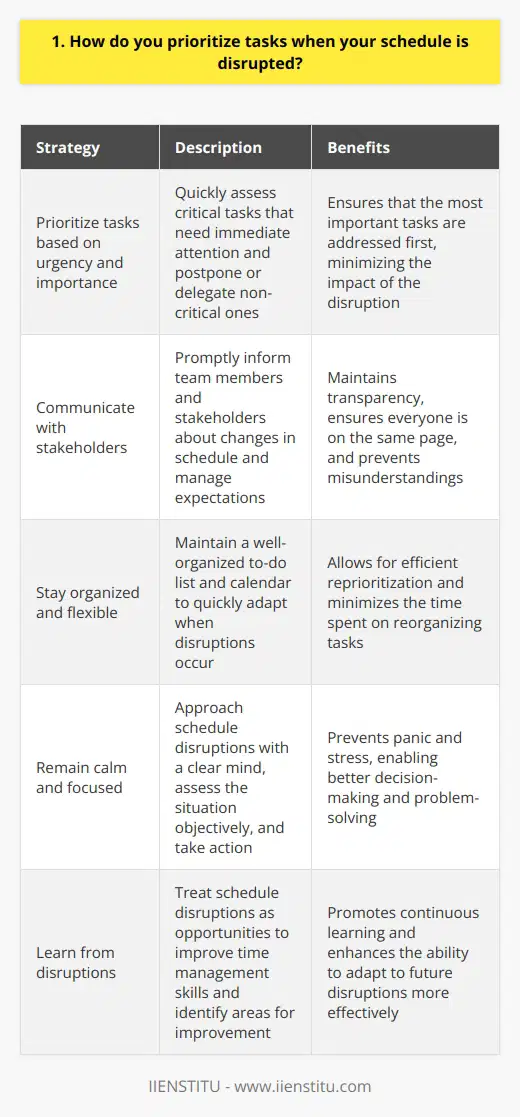
2. What strategies do you employ to get back on track when falling behind?
When I fall behind on a project, the first thing I do is take a step back and assess the situation. I try to identify the root causes of the delay and prioritize the most critical tasks. This helps me focus my efforts where they'll have the greatest impact.
Communicate with the Team
Next, I reach out to my team and stakeholders to let them know about the situation. I believe in being transparent and proactive in my communication. By keeping everyone informed, we can work together to adjust timelines and manage expectations.
Break It Down
To get back on track, I break the remaining work into smaller, manageable chunks. This makes the task feel less overwhelming and allows me to make steady progress. I set realistic mini-deadlines for each chunk to keep myself accountable.
Eliminate Distractions
During crunch time, I do my best to minimize distractions. I put my phone on silent, close unnecessary browser tabs, and find a quiet space to work. This helps me stay focused and productive.
Ask for Help
If I'm truly stuck, I'm not afraid to ask for help. I'll reach out to colleagues or mentors who have relevant expertise. Often, a fresh perspective is all it takes to get past a roadblock.
At the end of the day, falling behind is never ideal, but it happens to everyone. The key is to stay calm, communicate openly, and take targeted action to get back on track. With a bit of planning and persistence, I've always managed to rally and deliver in the end.
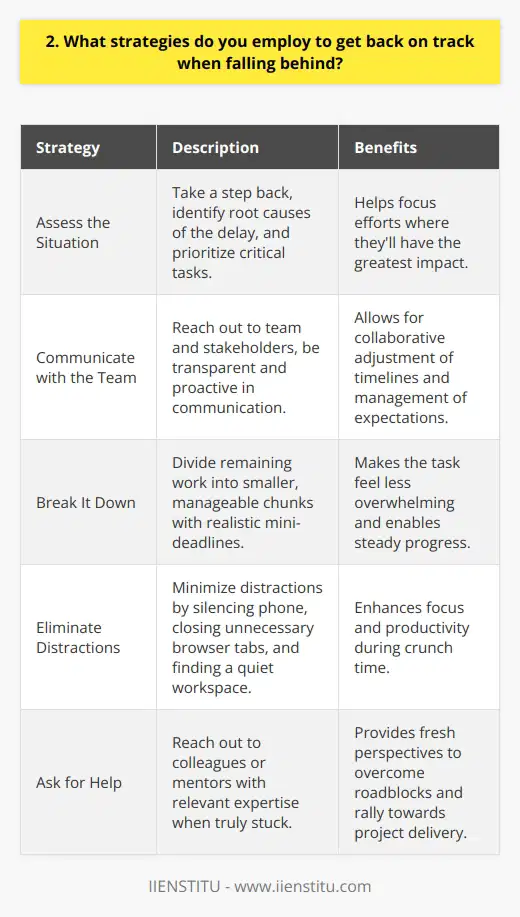
3. How do you adapt your time management plan when unexpected challenges arise?
When unexpected challenges arise, I adapt my time management plan by first assessing the situation and determining the most critical tasks. I prioritize these tasks and adjust my schedule accordingly, ensuring that I allocate sufficient time to address the challenges effectively.
Flexibility is Key
Being flexible is crucial in managing unexpected situations. I remain open to adjusting my plans and shifting my focus as needed. If a task requires more time than initially anticipated, I allocate additional time to ensure its completion.
Communication and Delegation
Effective communication is essential when dealing with unexpected challenges. I keep my team and stakeholders informed about any changes in the plan and seek their input and support when necessary. If possible, I delegate tasks to team members who have the capacity to assist, allowing me to focus on the most critical aspects of the challenge.
Lessons Learned
After successfully navigating an unexpected challenge, I take the time to reflect on the experience and identify any lessons learned. This helps me improve my time management skills and be better prepared for future challenges. I remember one instance where a last-minute client request came in just before a major deadline. By quickly reassessing priorities and collaborating with my team, we were able to deliver both the original project and the additional request on time. It taught me the importance of staying calm under pressure and being adaptable.
Conclusion
In summary, adapting my time management plan when unexpected challenges arise involves prioritization, flexibility, communication, and learning from experiences. By staying agile and focused, I can effectively navigate unexpected situations and deliver results despite the challenges.
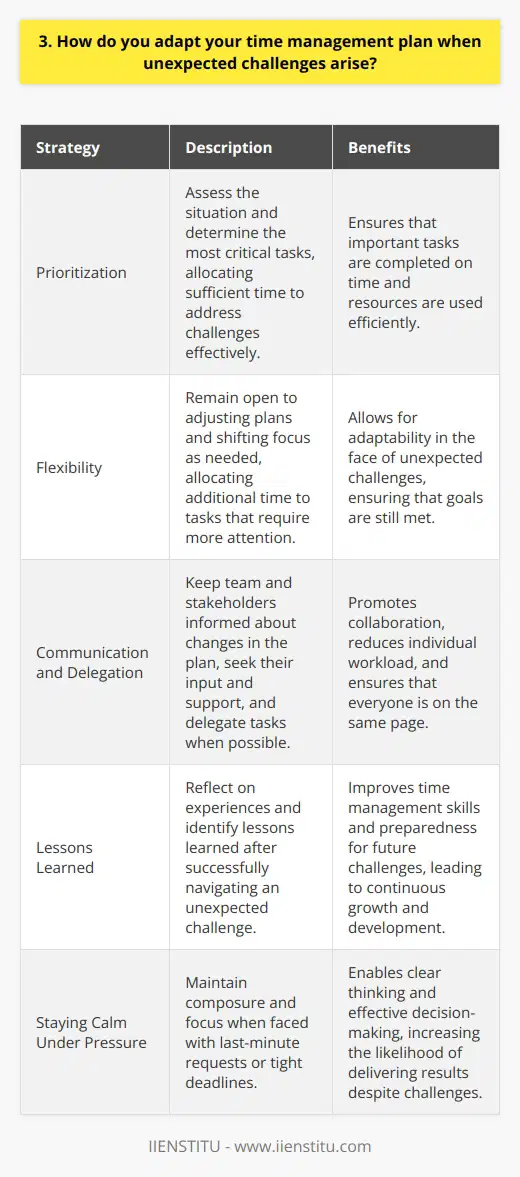
4. What lessons have you learned from a failed time management plan?
One of the most valuable lessons I've learned from a failed time management plan is the importance of flexibility. I once had a project where I meticulously planned out every task and deadline, but unexpected issues kept popping up. Instead of adjusting my plan, I stubbornly tried to stick to the original schedule, which led to missed deadlines and a lot of stress.
The Power of Prioritization
Another key takeaway was the power of prioritization. When my time management plan started to fall apart, I realized I had been spending too much time on low-priority tasks. I learned to focus on the most critical tasks first and be willing to let go of less important ones when necessary.
Communication is Key
I also discovered the significance of communication. When my plan began to unravel, I hesitated to reach out for help or let my team know about the issues I was facing. This only made the situation worse. Now, I know that open communication is essential for adapting to challenges and finding solutions.
Embracing Continuous Improvement
Finally, I learned to embrace continuous improvement. Instead of seeing my failed time management plan as a complete disaster, I chose to view it as a learning opportunity. I analyzed what went wrong, identified areas for improvement, and used that knowledge to create better plans in the future.
While a failed time management plan can be frustrating, it's also a chance to grow and develop new strategies. By staying flexible, prioritizing effectively, communicating openly, and embracing continuous improvement, I've been able to turn failures into valuable lessons that have made me a stronger project manager.
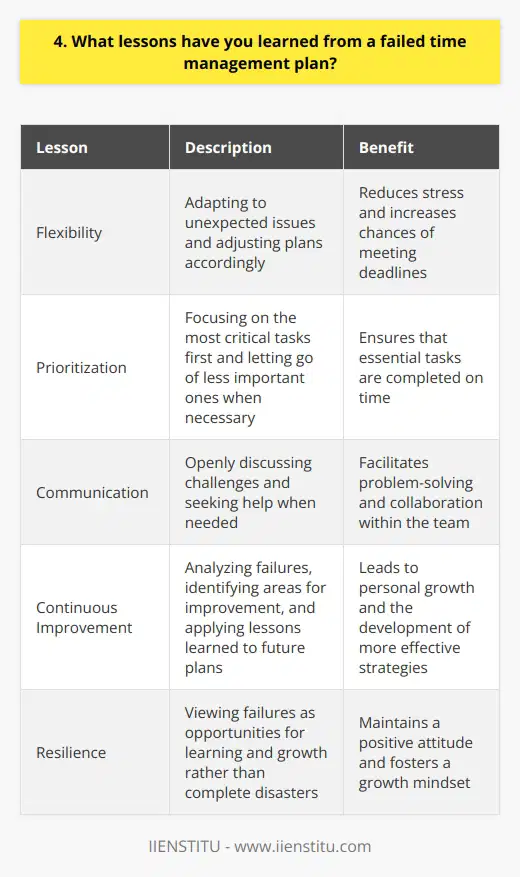
5. How do you ensure that a missed deadline doesn't derail your entire project?
When faced with a potential missed deadline, I take a proactive approach to minimize its impact on the overall project. Here are some strategies I employ:
Communicate Early and Often
As soon as I anticipate a possible delay, I reach out to my team and stakeholders. By keeping everyone in the loop, we can collaborate on finding solutions and adjusting expectations if needed.
Prioritize and Re-evaluate
I take a step back and assess which tasks are critical to the project's success. By focusing on the most important deliverables first, I can ensure that any delays have minimal impact on the overall timeline.
Break It Down
Sometimes, a missed deadline feels overwhelming. To make it more manageable, I break the remaining work into smaller, actionable steps. This helps me stay focused and motivated, even under pressure.
Learn and Adapt
After navigating a missed deadline, I reflect on what went wrong and how I can improve for future projects. Did I underestimate the scope? Were there unforeseen obstacles? By learning from these experiences, I become better equipped to handle challenges down the road.
At the end of the day, communication, prioritization, and adaptability are key. By staying proactive and solution-oriented, I can ensure that a missed deadline doesn't derail the entire project.
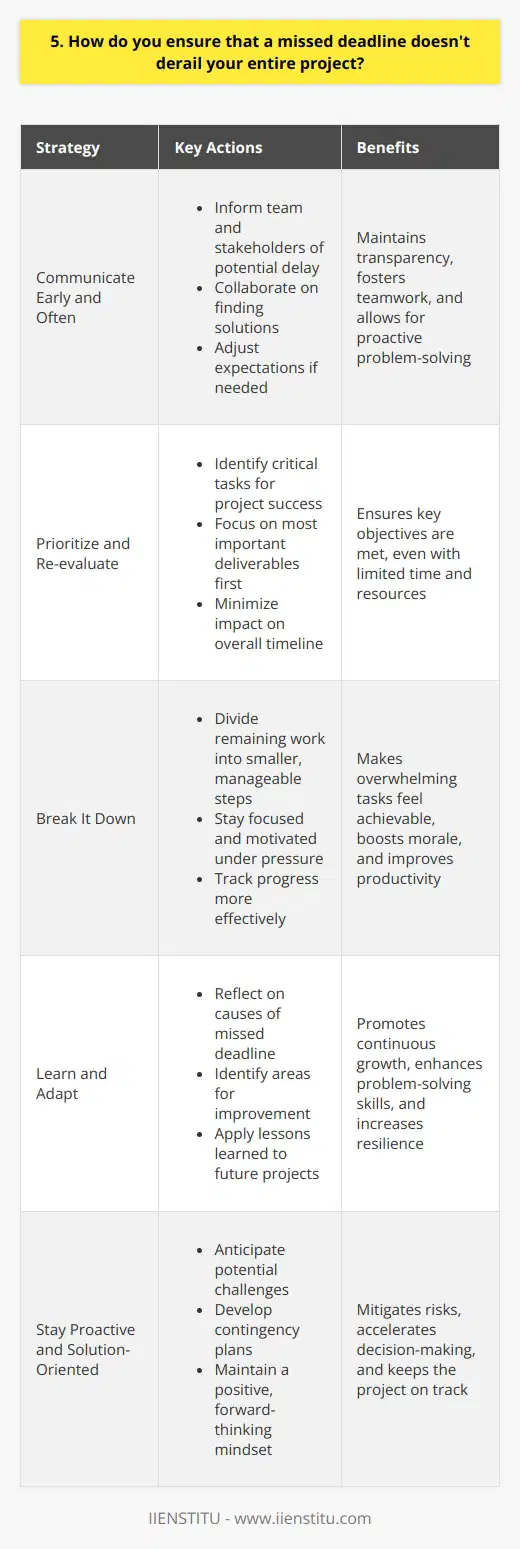
6. What steps do you take to re-evaluate and adjust your time management approach?
I regularly assess my time management strategies to ensure I'm working efficiently and effectively. When I notice tasks taking longer than expected or my to-do list growing, I know it's time to re-evaluate.
Identifying Time Wasters
First, I take a hard look at how I'm spending my time. I track my activities for a few days to pinpoint any time wasters or low-priority tasks consuming too much of my attention. Social media, unnecessary meetings, and procrastination are often the culprits for me.
Prioritizing and Planning
Next, I review my goals and priorities. I make sure I'm dedicating enough time to the projects and responsibilities that matter most. I use the Eisenhower Matrix to categorize my tasks by urgency and importance, which helps me focus on high-impact activities.
Based on these priorities, I adjust my daily and weekly plans. I block off time for deep work, limit distractions, and set realistic expectations for what I can accomplish.
Leveraging Tools and Techniques
I'm always looking for ways to streamline my processes. Time tracking software gives me valuable insights into my productivity patterns. The Pomodoro Technique helps me maintain focus and avoid burnout by working in short sprints with breaks in between.
I also delegate tasks when appropriate and automate repetitive aspects of my work. These strategies free up my time and energy for more strategic initiatives.
Continuous Improvement
Time management is an ongoing process. I regularly check in with myself, celebrate my successes, and learn from my challenges. By staying flexible and open to new approaches, I can keep optimizing how I work and make the most of every day.
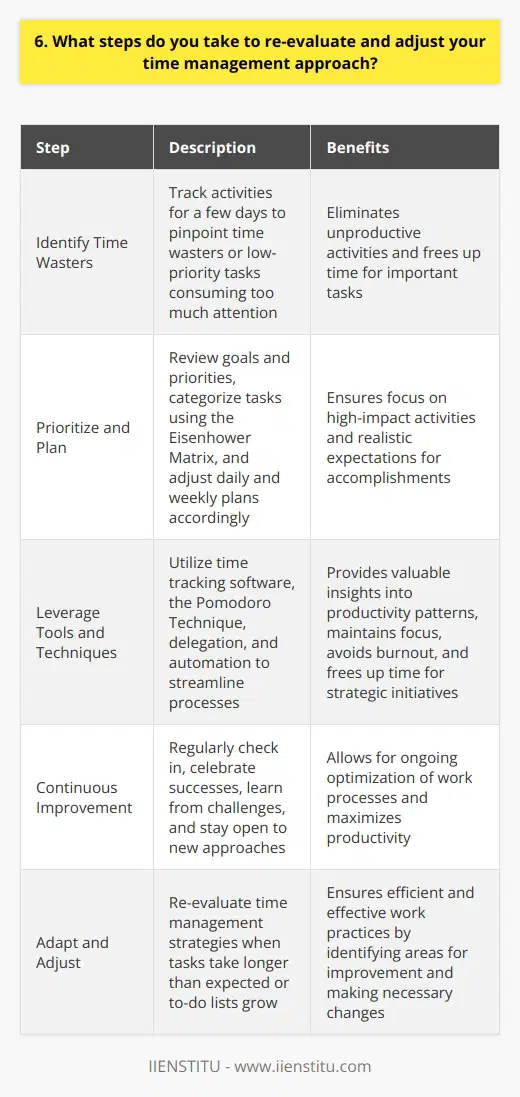
7. How do you communicate with your team when your time management plan needs to be revised?
When I need to revise my time management plan, I communicate openly and honestly with my team. I gather everyone together, either in person or via video call, and explain the situation clearly. Together, we assess the impact of the changes on our current projects and deadlines.
Collaborating on Solutions
I encourage my team members to share their thoughts and ideas for adjusting our approach. By involving them in the problem-solving process, we can develop creative solutions that work for everyone. I listen actively to their concerns and suggestions, ensuring they feel heard and valued.
Prioritizing and Delegating
Based on our discussion, we prioritize tasks and reallocate resources as needed. I delegate responsibilities according to each team member's strengths and availability. Clear communication is key during this process – I provide detailed instructions and confirm understanding to avoid confusion.
Staying Flexible and Adaptable
Throughout the project, I maintain open lines of communication with my team. Regular check-ins help us stay aligned and address any new challenges that arise. I remain flexible and adaptable, ready to make further adjustments if necessary. By fostering a supportive and collaborative environment, we can navigate changes in our time management plan successfully.
In my experience, effective communication is essential when revising a time management plan. By involving my team, prioritizing wisely, and staying adaptable, I've been able to lead projects to successful completion despite unexpected changes. I believe these skills would serve me well in this role at your company.
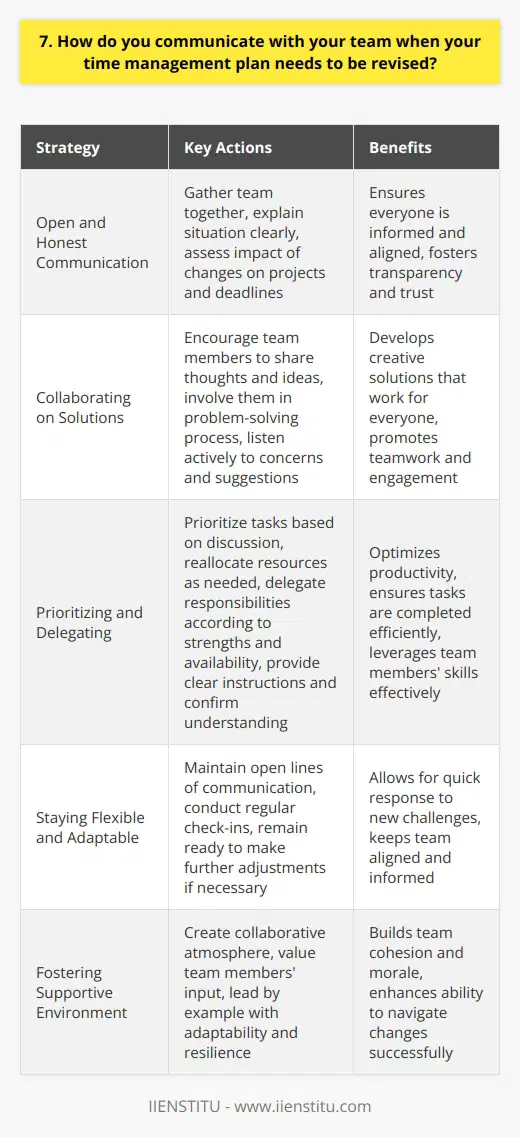
8. What techniques do you use to maintain focus and productivity after a setback?
When faced with a setback, I take a step back and analyze the situation objectively. I identify the factors that led to the setback and brainstorm potential solutions. This helps me maintain a positive outlook and focus on moving forward.
Prioritizing Tasks
I prioritize my tasks based on their importance and urgency. I tackle the most critical tasks first, ensuring that I make progress on my goals despite the setback. Breaking down larger tasks into smaller, manageable steps helps me maintain momentum and avoid feeling overwhelmed.
Staying Motivated
I find motivation in my personal and professional aspirations. I remind myself of the reasons behind my work and the impact I want to make. Surrounding myself with supportive colleagues and mentors helps me stay inspired and driven to overcome challenges.
Taking Breaks
I understand the importance of taking breaks to recharge and refocus. When I feel stuck or frustrated, I step away from my work for a few minutes. I engage in activities that help me relax, such as taking a short walk or practicing deep breathing exercises.
Learning from Setbacks
I view setbacks as opportunities for growth and learning. I reflect on what I could have done differently and identify areas for improvement. By embracing a growth mindset, I can bounce back stronger and better prepared to handle future challenges.
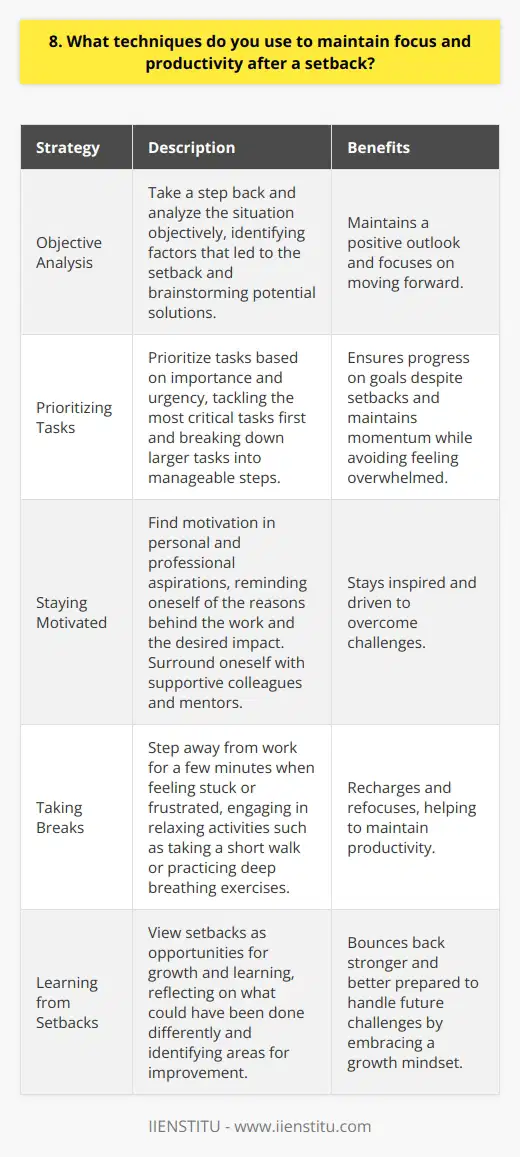
9. How do you balance short-term and long-term goals when your schedule is compromised?
I believe that balancing short-term and long-term goals is crucial, especially when faced with unexpected schedule changes. In such situations, I prioritize tasks based on their urgency and importance, while keeping the bigger picture in mind.
Effective Communication
When my schedule is compromised, I communicate openly with my team and stakeholders. I explain the situation and collaborate with them to adjust deadlines or redistribute tasks, ensuring that everyone is on the same page.
Flexibility and Adaptability
I remain flexible and adaptable, ready to pivot when necessary. If a short-term task requires immediate attention, I allocate my resources accordingly, while still carving out time for long-term objectives.
Time Management Techniques
To balance competing priorities, I employ various time management techniques. I break down larger goals into smaller, manageable tasks and use tools like calendars and to-do lists to stay organized and focused.
Continuous Re-evaluation
I continuously re-evaluate my priorities and adjust my approach as needed. By regularly assessing my progress and making informed decisions, I ensure that I'm always moving towards my long-term goals, even when short-term challenges arise.
In my previous role, I once faced a situation where an urgent client request conflicted with a long-term project deadline. By openly communicating with my team and the client, we were able to find a mutually beneficial solution. I worked extra hours to deliver the urgent request, while delegating some tasks to my colleagues to keep the long-term project on track. This experience taught me the importance of flexibility, collaboration, and effective prioritization in balancing short-term and long-term goals.
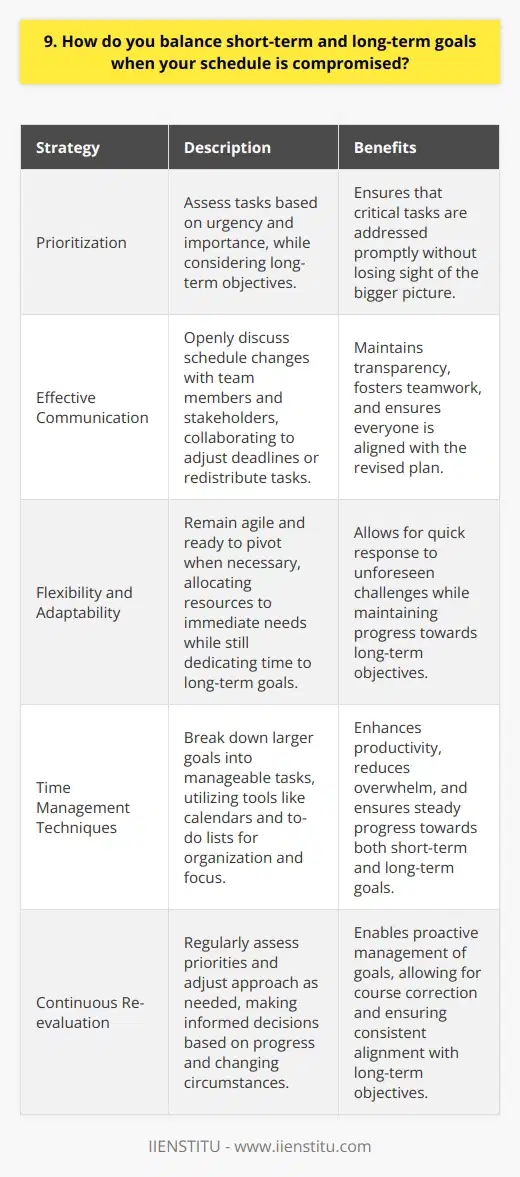
10. What role does flexibility play in your time management strategy?
Flexibility is a crucial component of my time management strategy. I believe that being adaptable allows me to handle unexpected challenges and shifting priorities effectively.
Embracing Change
In my experience, the ability to adapt to change is essential. I've learned to welcome new tasks and responsibilities, even when they disrupt my original plans. By maintaining a positive attitude and an open mind, I can quickly adjust my schedule and focus on the most pressing matters.
Prioritizing and Reprioritizing
When faced with multiple deadlines and competing demands, I prioritize my tasks based on their urgency and importance. However, I also understand that priorities can shift unexpectedly. When this happens, I reassess my to-do list and make necessary adjustments to ensure that I'm always working on the most critical tasks.
Communicating Effectively
Clear communication is key to maintaining flexibility. I keep my team and supervisors informed about my progress and any potential roadblocks. By doing so, I can collaborate with others to find solutions and adjust timelines as needed.
Continuous Learning
I believe that flexibility goes hand in hand with a willingness to learn and grow. I'm always eager to acquire new skills and knowledge that can help me adapt to changing circumstances. By staying curious and embracing opportunities for development, I can remain flexible and ready to tackle any challenge that comes my way.
In summary, flexibility is an integral part of my time management approach. By embracing change, prioritizing effectively, communicating clearly, and continuously learning, I can ensure that I'm always making the best use of my time and contributing to the success of my team and organization.
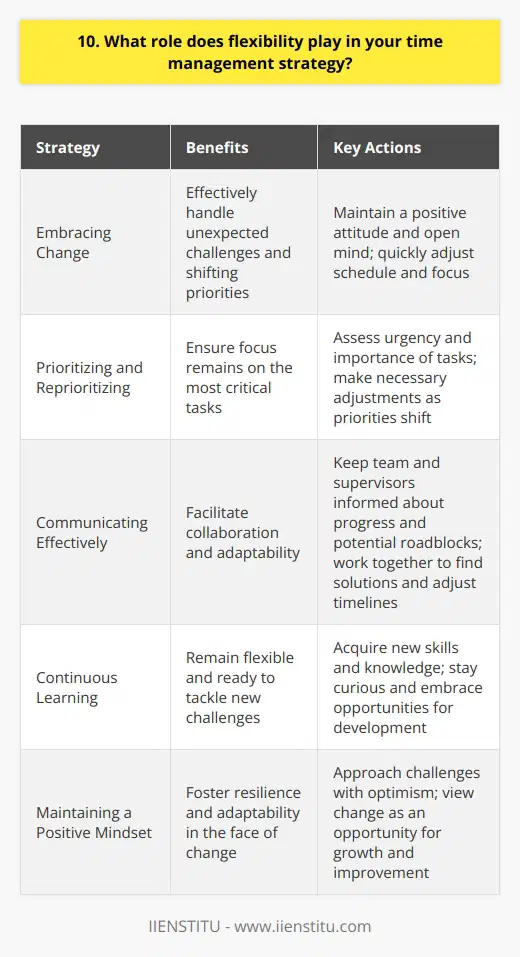
11. How do you manage stress and pressure when your time management plan fails?
When my time management plan fails, I take a step back and reassess the situation. I prioritize tasks based on urgency and importance, then tackle them one by one. Deep breathing exercises and short breaks help me stay calm and focused.
Communicate with the Team
If I'm working on a team project, I inform my colleagues about the situation. We discuss how to adjust our plan and redistribute tasks if needed. Open communication ensures everyone is on the same page.
Learn from Mistakes
I try to identify what caused my time management plan to fail in the first place. Was I too optimistic about how much I could get done? Did unexpected issues arise? I take note of these factors and use them to improve my planning skills for next time.
Stay Positive
It's easy to get overwhelmed when things don't go as planned, but I try to maintain a positive attitude. I remind myself that setbacks are opportunities to learn and grow. With a clear head and can-do outlook, I'm better equipped to handle stress and pressure.
At the end of the day, I'm only human. I don't beat myself up over failed plans or missed deadlines. What matters is that I do my best to adapt, keep moving forward, and deliver quality work, even if it means adjusting my timeline. That's what I strive for, both in my personal life and my career.
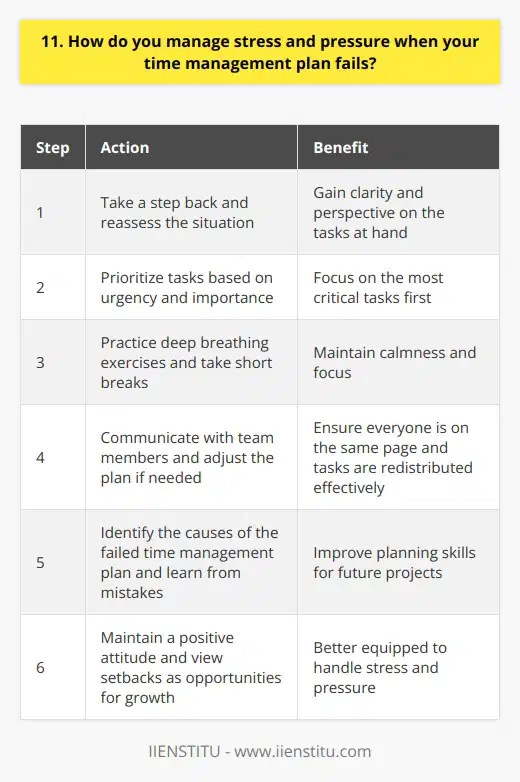
12. What tools or technologies do you use to help you recover from a failed time management plan?
When faced with a failed time management plan, I rely on a combination of tools and strategies to recover. Firstly, I take a step back and reassess my priorities, focusing on the most critical tasks. This helps me identify where I need to allocate my time and energy.
Communication is Key
I believe in open communication with my team and stakeholders. If I realize I'm falling behind, I promptly reach out to discuss adjustments to deadlines or delegation of tasks. This transparency ensures everyone is on the same page and working towards a common goal.
Leveraging Technology
Technology plays a crucial role in my time management recovery plan. I utilize project management software like Trello or Asana to visualize my workload and track progress. These tools help me break down larger tasks into manageable steps and set realistic deadlines.
Flexibility and Adaptability
I've learned that being flexible is essential when things don't go as planned. If a particular approach isn't working, I'm not afraid to pivot and try a different strategy. Adaptability allows me to find creative solutions and keep moving forward.
Self-Care and Reflection
Lastly, I prioritize self-care during times of stress. Taking short breaks to recharge helps me maintain focus and productivity. I also make it a habit to reflect on what went wrong and learn from my mistakes, so I can improve my time management skills for future projects.
By combining these tools and approaches, I'm able to effectively recover from setbacks and get back on track towards achieving my goals.

13. How do you involve your team members in the process of recovering a failed time management plan?
When a time management plan fails, it's crucial to involve the team in the recovery process. I always start by openly discussing the challenges we faced and encouraging everyone to share their perspectives. This creates a safe space for honest communication and idea-sharing.
Collaborative Problem-Solving
Next, I divide the team into smaller groups to brainstorm solutions. Each group focuses on specific aspects of the project, such as resource allocation or task prioritization. By working together, we can identify creative strategies to get back on track.
I remember a time when my team's project was falling behind schedule. We gathered for a "recovery session" where everyone contributed ideas. One team member suggested using a new project management tool, while another proposed reallocating tasks based on each person's strengths. By combining these ideas, we developed a revised plan that ultimately led to successful project completion.
Continuous Improvement
After implementing the recovery plan, I schedule regular check-ins with the team. We review progress, discuss any new obstacles, and make adjustments as needed. This iterative approach helps us stay agile and responsive throughout the project lifecycle.
I believe that involving team members in the recovery process fosters a sense of ownership and accountability. When everyone feels invested in the project's success, they're more likely to go above and beyond to achieve our goals. By working collaboratively and maintaining open lines of communication, we can overcome even the most challenging time management setbacks.

14. What methods do you use to identify the root cause of a failed time management plan?
When a time management plan fails, I take a step back and analyze the situation objectively. I ask myself questions like:
What were the main obstacles?
Were there unexpected interruptions or distractions that threw off my schedule? Did I underestimate the complexity of certain tasks?
Did I prioritize effectively?
I reflect on whether I focused on the most important tasks first or got sidetracked by less crucial activities.
Was I realistic in my planning?
Sometimes I'm overly optimistic about how much I can accomplish in a day. I'm learning to be more realistic.
Did I break down tasks sufficiently?
Large projects can feel overwhelming. I've found that breaking them into smaller, manageable steps helps me stay on track.
Was I flexible enough?
Life is unpredictable. I try to build some flexibility into my plans to account for unexpected challenges or opportunities.
By honestly assessing these factors, I can usually pinpoint the root causes of a failed time management plan. From there, I brainstorm solutions and adjust my approach moving forward. It's an ongoing process of self-reflection and continuous improvement.
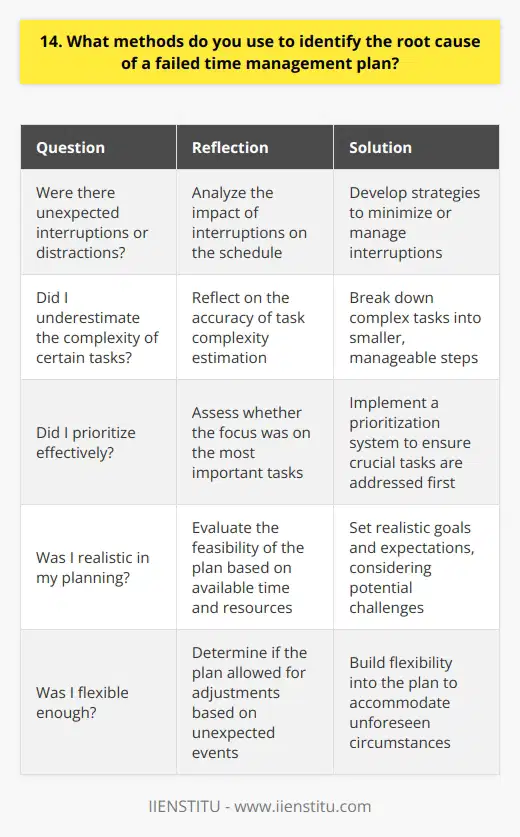
15. How do you prevent a failed time management plan from affecting your other responsibilities?
When faced with a failed time management plan, I immediately reassess my priorities and adjust my schedule accordingly. By focusing on the most critical tasks first, I ensure that my other responsibilities are not neglected. Communication is key in these situations, so I keep my team and superiors informed of any changes or delays.
Staying Flexible and Adaptable
I've learned that even the best-laid plans can go awry, so I always try to remain flexible. If one strategy isn't working, I'm not afraid to pivot and try a different approach. By staying adaptable, I can quickly get back on track without letting the setback derail my other projects.
Learning from Mistakes
When a time management plan fails, I take it as an opportunity to learn and grow. I analyze what went wrong and look for ways to improve my processes in the future. By continuously refining my time management skills, I become better equipped to handle unexpected challenges down the road.
Maintaining a Positive Attitude
It's easy to get discouraged when things don't go as planned, but I've found that maintaining a positive outlook is essential. Instead of dwelling on the failure, I focus on finding solutions and moving forward. This mindset helps me stay motivated and ensures that my other responsibilities don't suffer.
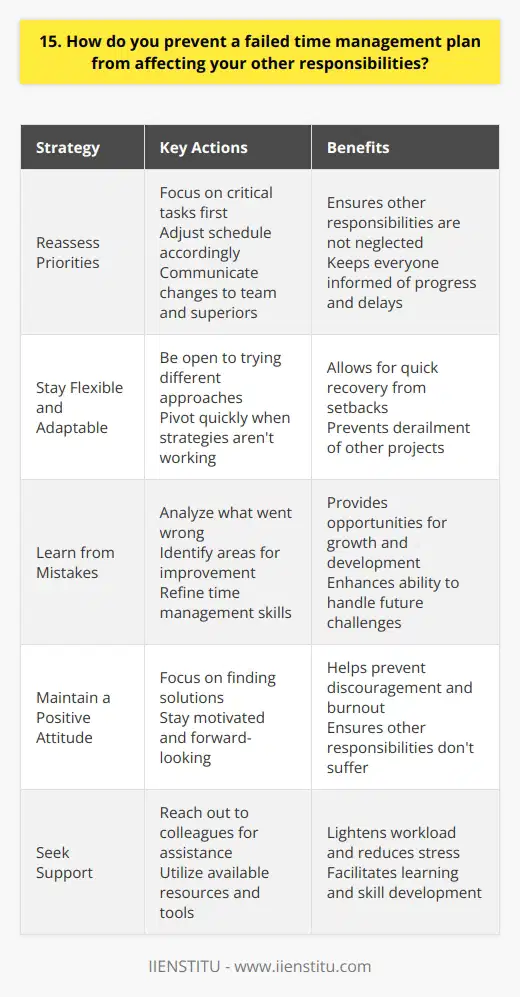
16. What steps do you take to rebuild confidence in your time management abilities after a setback?
Rebuilding confidence in my time management abilities after a setback is crucial for personal and professional growth. I take a proactive approach to identify the root causes of the setback and learn from my mistakes. By reflecting on what went wrong, I can develop strategies to prevent similar issues in the future.
Focusing on Positive Outcomes
Instead of dwelling on the negative aspects of the setback, I choose to focus on the positive outcomes. I remind myself of past successes and the skills I possess that have helped me overcome challenges before. By shifting my mindset, I boost my confidence and motivation to tackle the task at hand.
Breaking Tasks into Manageable Steps
When faced with a daunting project, I break it down into smaller, manageable steps. This approach helps me feel less overwhelmed and allows me to concentrate on one thing at a time. As I complete each step, I gain a sense of accomplishment, which further enhances my confidence in my time management abilities.
Seeking Support and Guidance
I'm not afraid to reach out for support and guidance when needed. Collaborating with colleagues or seeking advice from mentors can provide fresh perspectives and strategies for effective time management. Their insights and encouragement can help rebuild my confidence and inspire me to persevere through the setback.
Celebrating Small Wins
I make it a point to celebrate small wins along the way. Recognizing progress, no matter how small, boosts my confidence and keeps me motivated. Each milestone I reach serves as a reminder of my capabilities and strengthens my belief in my time management skills.
By implementing these strategies, I've been able to rebuild my confidence in my time management abilities after setbacks. I remember a specific project where I initially struggled with meeting deadlines. By breaking the project into smaller tasks, seeking guidance from a colleague, and celebrating each completed step, I not only finished the project on time but also received praise for my efficient work. This experience taught me the importance of resilience and adapting my approach when faced with challenges.
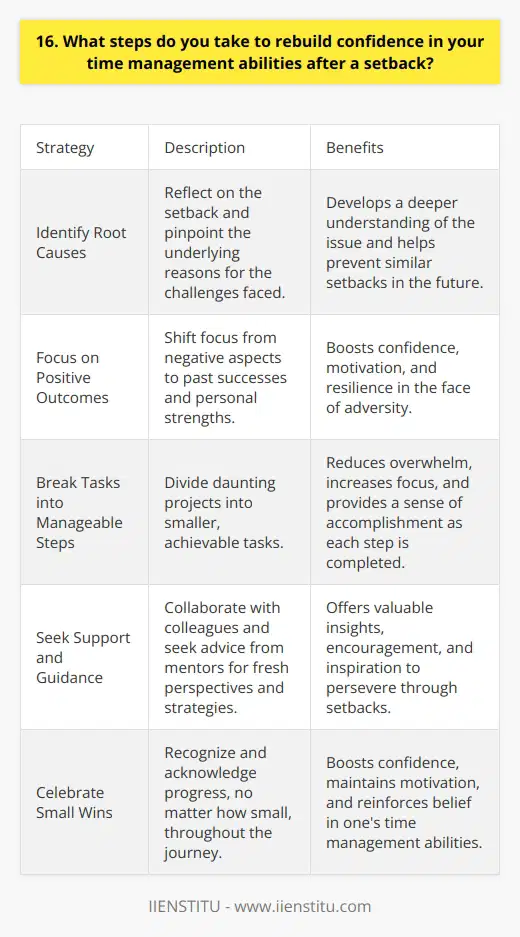
17. How do you manage client or stakeholder expectations when your time management plan fails?
When faced with a situation where my time management plan fails, I take a proactive approach to managing client expectations. Communication is key in these situations, so I make sure to keep stakeholders informed at every step.
Assess the Situation
First, I quickly assess what went wrong and how it will impact the project timeline. I identify any potential solutions or workarounds that could help get things back on track.
Be Transparent
Next, I reach out to the client or stakeholder to explain the situation honestly and transparently. I take responsibility for the delay and apologize for any inconvenience caused.
Propose a Plan
When communicating with the client, I come prepared with a proposed plan of action. This might involve adjusting deadlines, reallocating resources, or finding ways to streamline processes to make up for lost time.
Collaborate on Solutions
I actively involve the client in brainstorming solutions and making decisions about how to move forward. By collaborating closely, we can often find creative ways to get the project back on track.
Provide Regular Updates
Throughout the process, I make sure to provide regular progress updates to the client. This helps build trust and shows that I'm working diligently to correct the situation.
Learn and Adapt
Finally, I always take time to reflect on what I can learn from the experience. By analyzing what went wrong, I can adapt my approach and improve my time management skills for future projects.

18. What role does delegation play in your strategy to recover from a failed time management plan?
I believe that delegation is a crucial aspect of effective time management and recovery from setbacks. In my experience, delegating tasks to capable team members allows me to focus on high-priority responsibilities and ensures that projects stay on track, even when unexpected challenges arise.
Identifying Delegation Opportunities
When a time management plan fails, I quickly assess the situation and identify tasks that can be delegated. This involves evaluating the skills and availability of my team members and determining which responsibilities can be reassigned without compromising quality or deadlines.
Communicating Expectations
Clear communication is key to successful delegation. I make sure to provide detailed instructions, set realistic deadlines, and establish open lines of communication to address any questions or concerns. By setting clear expectations, I empower my team to take ownership of their tasks and contribute to the project's success.
Monitoring Progress
While delegation is important, it's equally crucial to monitor the progress of delegated tasks. I schedule regular check-ins with team members to ensure that they have the resources and support they need to complete their assignments effectively. This proactive approach allows me to identify and address potential roadblocks before they escalate into major issues.
Fostering a Collaborative Environment
I believe in fostering a collaborative and supportive work environment where team members feel valued and empowered. By encouraging open communication, providing constructive feedback, and recognizing individual contributions, I create a team dynamic that is resilient and adaptable in the face of challenges.
Learning from Setbacks
Finally, I view setbacks as opportunities for growth and learning. When a time management plan fails, I take the time to reflect on the factors that contributed to the setback and identify areas for improvement. By learning from these experiences and incorporating those lessons into future planning, I continuously refine my delegation strategy and become a more effective leader.

19. How do you ensure that you learn from your mistakes and improve your time management skills?
I believe that learning from mistakes and improving time management skills are ongoing processes. Whenever I encounter a setback or realize I could have managed my time better, I take a step back and reflect on what went wrong. I ask myself questions like, "What could I have done differently?" and "How can I prevent this from happening again?"
Strategies for Learning from Mistakes
One strategy I use is to keep a journal where I write down my mistakes and the lessons I learned from them. This helps me internalize the insights and apply them in the future. I also seek feedback from colleagues and supervisors, as they often provide valuable perspectives and suggestions for improvement.
Improving Time Management Skills
To enhance my time management skills, I regularly review my tasks and priorities. I break down large projects into smaller, manageable steps and set realistic deadlines for each one. I use tools like calendars and to-do lists to stay organized and on track.
Avoiding Procrastination
Another key aspect is identifying and minimizing distractions. When I notice myself procrastinating, I try to understand the underlying reasons and address them head-on. Whether it's breaking down a daunting task into smaller chunks or finding a more conducive work environment, I actively seek solutions.
Continuous Learning and Adaptation
I believe that continuous learning and adaptation are essential. I stay open to new strategies, tools, and best practices for time management and productivity. By embracing a growth mindset and being willing to experiment and adjust my approach, I can continuously improve and deliver better results.
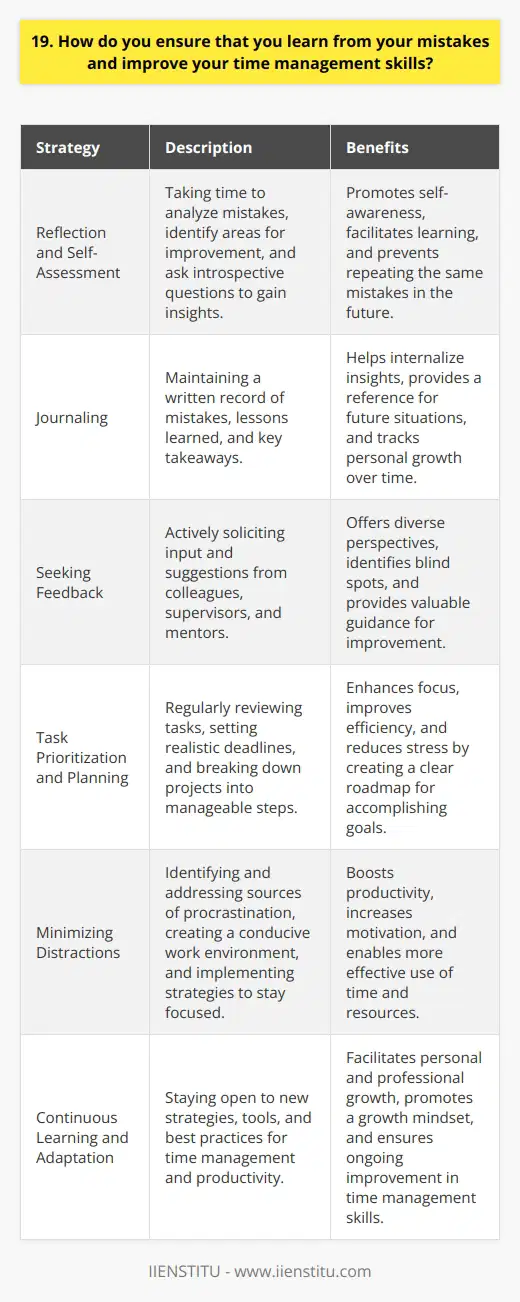
20. What techniques do you use to break down complex tasks when your schedule is off track?
When faced with complex tasks and a derailed schedule, I employ several techniques to break them down into manageable steps. First, I prioritize the most critical and time-sensitive tasks, ensuring that I tackle them before less urgent matters. This helps me regain control of my schedule and reduces stress.
Breaking Tasks into Smaller, Actionable Steps
Next, I divide each complex task into smaller, actionable steps. By creating a checklist of these steps, I can track my progress and maintain momentum. This approach also allows me to identify potential roadblocks early on and develop solutions to overcome them.
Collaborating with Team Members
Collaborating with team members is another effective strategy I use. By delegating tasks and seeking input from colleagues, I can leverage their expertise and lighten my workload. Open communication ensures that everyone is on the same page and working towards a common goal.
Staying Organized and Focused
To stay organized and focused, I use project management tools like Trello or Asana. These platforms help me visually map out tasks, set deadlines, and track progress. I also minimize distractions by closing unnecessary tabs and silencing notifications during dedicated work sessions.
Reflecting and Adjusting
Finally, I regularly reflect on my progress and adjust my approach as needed. If a particular strategy isn't working, I'm not afraid to pivot and try something new. By remaining adaptable and open to change, I can successfully navigate even the most challenging projects and get my schedule back on track.
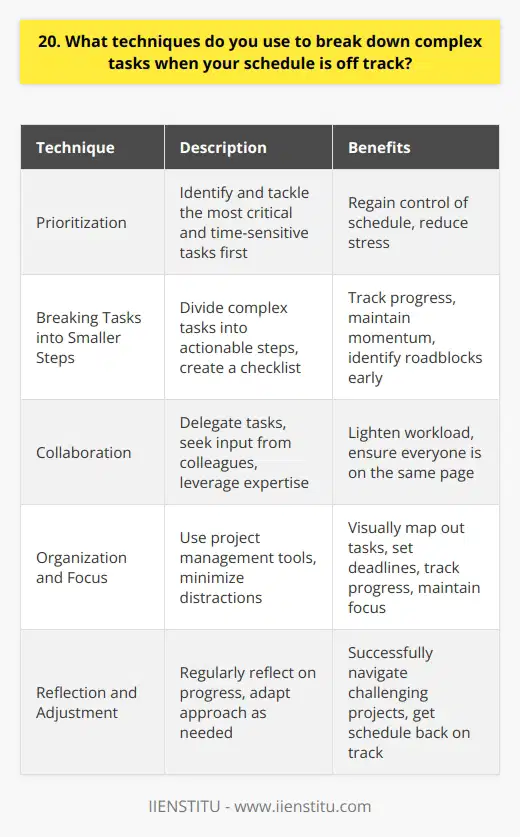
21. How do you prioritize self-care and avoid burnout when recovering from a failed time management plan?
Prioritizing self-care is essential for avoiding burnout, especially when recovering from a failed time management plan. I've learned that taking breaks, setting boundaries, and practicing mindfulness are key strategies for maintaining well-being.
Take Regular Breaks
I make sure to schedule short breaks throughout my workday to recharge and refocus. Even a 5-minute walk outside or some deep breathing exercises can help me feel refreshed and more productive.
Set Clear Boundaries
It's important to establish boundaries between work and personal life. I communicate my availability to colleagues and stick to a consistent schedule as much as possible. Disconnecting from work during off-hours allows me to fully relax and recharge.
Practice Mindfulness
Mindfulness techniques like meditation and journaling help me stay grounded and manage stress. Taking just 10 minutes each day to focus on the present moment clears my mind and puts things in perspective.
Prioritize Sleep and Exercise
Getting enough quality sleep and regular exercise are essential for my physical and mental health. I aim for 7-8 hours of sleep per night and try to fit in at least 30 minutes of movement daily, whether that's going for a jog or doing yoga.
By making self-care a priority, I'm able to bounce back from setbacks and avoid burnout in the long run. It's an ongoing process, but these strategies help me stay balanced and perform my best at work.
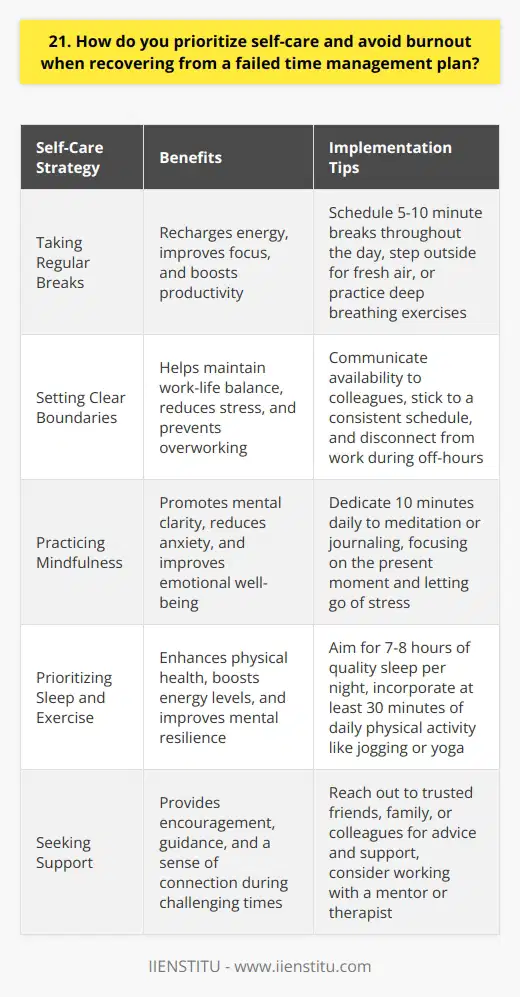
22. What strategies do you use to manage conflicting priorities when your schedule is disrupted?
When faced with conflicting priorities and a disrupted schedule, I rely on a few key strategies to stay on track and deliver results.
Prioritize Based on Impact and Urgency
First, I take a step back and assess which tasks will have the greatest impact on our goals. I also consider the urgency of each task and prioritize accordingly. This helps me focus on what matters most.
Communicate and Collaborate
Open communication is essential when plans change. I proactively reach out to my manager and colleagues to discuss shifting priorities. By working together, we can come up with creative solutions to keep projects moving forward, even when unexpected challenges arise.
Stay Flexible and Adaptable
In my experience, the key to managing a dynamic schedule is staying flexible. I'm always ready to pivot and adjust my approach as needed. By embracing change and being adaptable, I can navigate disruptions more effectively.
Focus on Results
Ultimately, what matters most is delivering quality work that drives results. Even when my schedule is in flux, I stay focused on the end goal. I put in the extra effort to get things done, no matter what it takes.
While disruptions can be stressful, I've found that these strategies help me stay calm, focused, and productive. It's all about being proactive, communicating openly, and staying committed to delivering my best work.
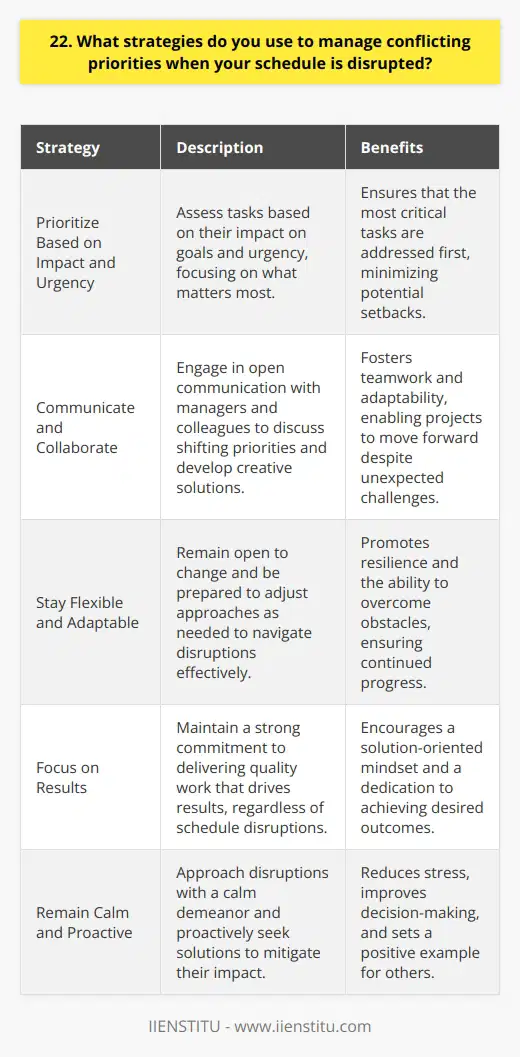
23. How do you adapt your communication style when your time management plan needs to be adjusted?
When faced with the need to adjust my time management plan, I adapt my communication style accordingly. I understand that clear and concise communication is essential to ensure everyone is on the same page.
Prioritizing Important Information
I prioritize sharing the most critical information first. This helps the team quickly grasp the situation and understand what needs to be done to get back on track.
Using Multiple Communication Channels
Depending on the urgency and complexity of the message, I use various communication channels. For urgent matters, I prefer face-to-face discussions or phone calls to ensure immediate attention and swift action.
Tailoring Messages to the Audience
I tailor my messages to suit the needs and preferences of my audience. For example, when communicating with higher management, I focus on the big picture and potential impacts on the project.
Encouraging Open Dialogue
I believe in fostering an open and collaborative environment where team members feel comfortable asking questions and providing feedback. This helps identify potential issues early on and allows for quick adjustments to the plan.
In my previous role, we encountered a situation where a key deliverable was delayed due to unforeseen circumstances. I immediately called a team meeting to discuss the issue and brainstorm solutions. By adapting my communication style to be more direct and action-oriented, we were able to quickly realign our efforts and get the project back on track.
Ultimately, being flexible and adaptable in my communication style has been crucial in successfully navigating changes to my time management plans. It ensures everyone remains informed, engaged, and working towards a common goal.
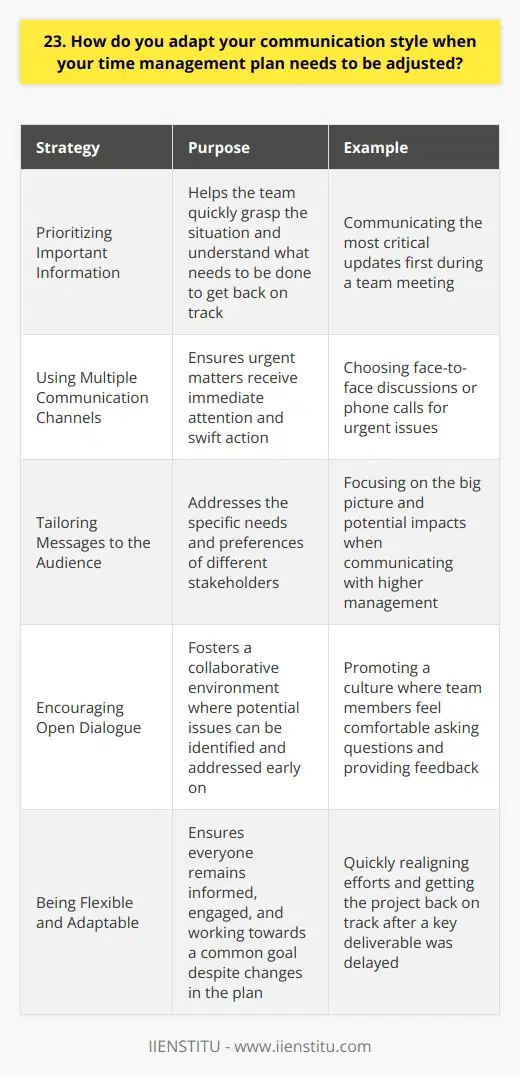
24. What role does goal-setting play in your approach to recovering from a failed time management plan?
Goal-setting is crucial when recovering from a failed time management plan. I always start by identifying what went wrong and why. This helps me learn from my mistakes and avoid repeating them in the future.
Setting SMART Goals
Next, I set SMART goals that are specific, measurable, achievable, relevant, and time-bound. These goals give me a clear roadmap to follow as I work to get back on track.
For example, if I missed a deadline because I underestimated how long a task would take, I might set a goal to break down future tasks into smaller, more manageable steps and build in extra buffer time to account for unexpected delays.
Prioritizing and Adjusting
As I work towards my goals, I prioritize my tasks based on importance and urgency. If something isn't working, I'm not afraid to adjust my plan and try a different approach.
I also make sure to celebrate my successes along the way, no matter how small. This helps me stay motivated and focused on the bigger picture.
Seeking Support and Accountability
Finally, I seek out support and accountability from my colleagues and supervisors. I'm not afraid to ask for help when I need it or to admit when I've made a mistake.
By setting clear goals, staying flexible, and being honest about my progress, I'm able to bounce back from setbacks and continue growing in my role.
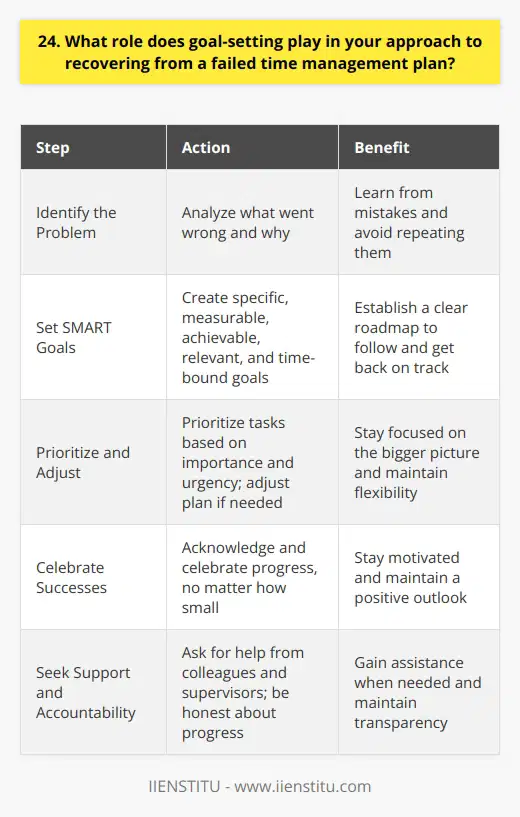
25. How do you maintain a positive attitude and stay motivated when facing time management challenges?
I maintain a positive attitude and stay motivated when facing time management challenges by focusing on solutions rather than dwelling on problems. Whenever I encounter a setback or obstacle, I take a step back and analyze the situation objectively. This helps me identify the root cause of the issue and brainstorm potential solutions.
Prioritizing Tasks
One key strategy I employ is prioritizing my tasks based on urgency and importance. By tackling the most critical tasks first, I ensure that I'm making the best use of my time and energy. I also break larger projects into smaller, manageable steps to avoid feeling overwhelmed.
Maintaining a Positive Mindset
I find that maintaining a positive mindset is crucial when facing time management challenges. Instead of getting frustrated or discouraged, I try to view setbacks as opportunities for growth and learning. I remind myself of past successes and the skills and strengths that have helped me overcome similar challenges in the past.
Seeking Support and Guidance
When needed, I'm not afraid to reach out to colleagues or supervisors for support and guidance. Collaborating with others can often lead to fresh perspectives and innovative solutions. I also make an effort to continuously develop my time management skills through workshops, webinars, and reading relevant books or articles.
By staying focused on solutions, maintaining a positive outlook, and proactively seeking ways to improve my time management abilities, I'm able to stay motivated and overcome challenges effectively.

26. What techniques do you use to minimize distractions and stay focused during recovery?
As someone who has struggled with distractions in the past, I've learned a few techniques that help me stay focused during recovery. Here are some of the methods I use:
Prioritize tasks
I start by making a list of the most important tasks I need to accomplish. This helps me stay on track and avoid getting sidetracked by less critical activities.
Eliminate distractions
I try to eliminate as many distractions as possible. This might mean turning off my phone, closing unnecessary browser tabs, or finding a quiet place to work.
Take breaks
When I feel my focus starting to slip, I take a short break. I might stretch, go for a quick walk, or do some deep breathing exercises. These little breaks help me recharge and come back to my tasks with renewed energy.
Use a timer
I often use a timer to help me stay on task. I'll set it for a specific amount of time, usually 25-30 minutes, and work until the timer goes off. Then I'll take a short break before starting the next task.
Reward myself
Finally, I find it helpful to reward myself when I've completed a task or reached a milestone. This might be something small, like a favorite snack or a few minutes of downtime. Having something to look forward to helps me stay motivated and focused on the task at hand.
These are just a few of the techniques I use to minimize distractions and stay focused during recovery. It's an ongoing process, but with practice and persistence, it gets easier over time.
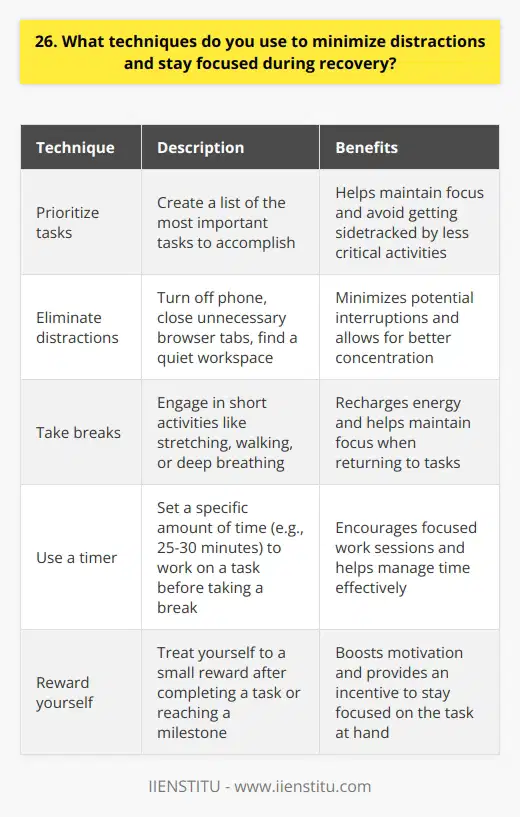
27. How do you involve your supervisor or manager in the process of recovering a failed time management plan?
When a time management plan fails, it's crucial to involve your supervisor or manager in the recovery process. Openly communicate the challenges you've encountered and the steps you've taken to address them. Seek their guidance and support in identifying the root causes of the failure and developing a revised plan.
Collaborating with Your Supervisor
Schedule a meeting with your supervisor to discuss the situation in detail. Be prepared to present a clear analysis of what went wrong and how it impacted your work. Listen actively to their feedback and suggestions, as they may provide valuable insights based on their experience and broader perspective.
Developing a New Plan
Work together with your supervisor to create a new time management plan that addresses the shortcomings of the previous one. Break down larger tasks into smaller, manageable steps and set realistic deadlines. Ensure that the revised plan aligns with your team's goals and your supervisor's expectations.
Regular Check-ins and Progress Updates
Propose regular check-in meetings with your supervisor to discuss your progress and any obstacles you encounter along the way. These meetings will help keep you accountable and provide opportunities for timely adjustments if needed. Be proactive in seeking feedback and support throughout the process.
Learning from the Experience
Reflect on the lessons learned from the failed time management plan. Identify areas where you can improve your skills, such as prioritization, delegation, or communication. Share these insights with your supervisor and demonstrate your commitment to personal growth and development.
Remember, involving your supervisor in the recovery process shows your proactivity, accountability, and willingness to learn from setbacks. By working collaboratively and maintaining open lines of communication, you can overcome the challenges and get back on track towards achieving your goals.
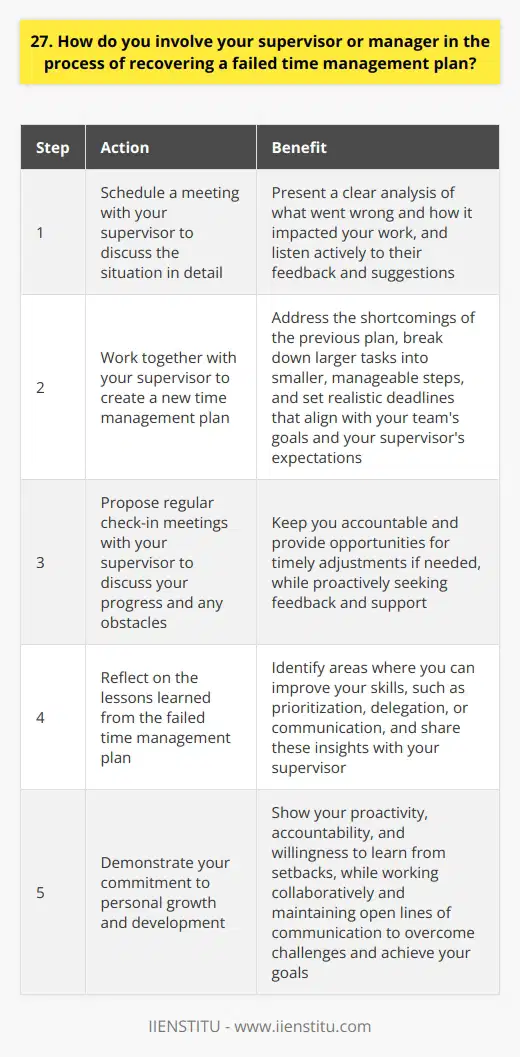
28. What steps do you take to re-prioritize tasks and deadlines when your schedule is compromised?
When faced with unexpected changes to my schedule, I take a proactive approach to re-prioritizing tasks and deadlines. First, I assess the impact of the disruption on my current workload and identify which tasks are most critical. This helps me determine what needs immediate attention and what can be postponed or delegated.
Communicating with Stakeholders
I believe in maintaining open lines of communication with my team and stakeholders. When my schedule is compromised, I promptly inform them about the situation and provide a realistic timeline for delivering the affected tasks. This transparency helps manage expectations and allows for collaborative problem-solving.
Flexible Planning and Adaptation
I've learned that flexibility is key when it comes to managing a dynamic work environment. I'm comfortable adjusting my plans and adapting to new priorities as needed. By being agile and open to change, I can quickly pivot my focus to address the most pressing matters without getting overwhelmed.
Leveraging Technology and Tools
To stay organized and on track, I rely on various productivity tools and techniques. I use project management software to create detailed task lists, set reminders, and track progress. This helps me visualize my workload, identify potential bottlenecks, and make informed decisions about re-prioritization.
Seeking Support and Resources
When my schedule is compromised, I'm not afraid to reach out for help. I collaborate with my colleagues, delegate tasks when appropriate, and leverage the expertise of others to ensure that critical deadlines are met. By working as a team, we can collectively navigate challenges and find effective solutions.
In summary, re-prioritizing tasks and deadlines when faced with a compromised schedule requires a combination of assessment, communication, flexibility, organization, and collaboration. By taking a proactive and adaptable approach, I can effectively manage competing priorities and deliver high-quality work, even in the face of unexpected challenges.

29. How do you manage the expectations of your colleagues when your time management plan fails?
When my time management plan fails, I take a proactive approach to manage my colleagues' expectations. I believe in open communication and transparency to maintain trust and credibility within the team.
Prioritizing Tasks
First, I assess the situation and prioritize tasks based on urgency and importance. I focus on critical deliverables that have the most significant impact on the team's goals. This helps me allocate my time and resources effectively.
Communicating with Colleagues
Next, I reach out to my colleagues and inform them about the challenges I'm facing. I explain the reasons behind the delay and provide a realistic timeline for when they can expect the work to be completed. I also listen to their concerns and address any questions they may have.
Collaborating and Delegating
To manage the workload, I collaborate with my teammates and explore opportunities for delegation. I identify tasks that can be shared or reassigned to other team members with the necessary skills and availability. This helps distribute the work and ensures that critical tasks are completed on time.
Learning and Improving
Lastly, I take the opportunity to learn from the experience and improve my time management skills. I reflect on what went wrong and identify areas for improvement. I seek feedback from my colleagues and incorporate their suggestions into my future planning. This helps me develop a more robust and realistic time management approach.
In summary, when my time management plan fails, I prioritize tasks, communicate transparently with my colleagues, collaborate and delegate, and learn from the experience to improve my skills. By taking these steps, I can manage my colleagues' expectations effectively and maintain a positive working relationship with them.
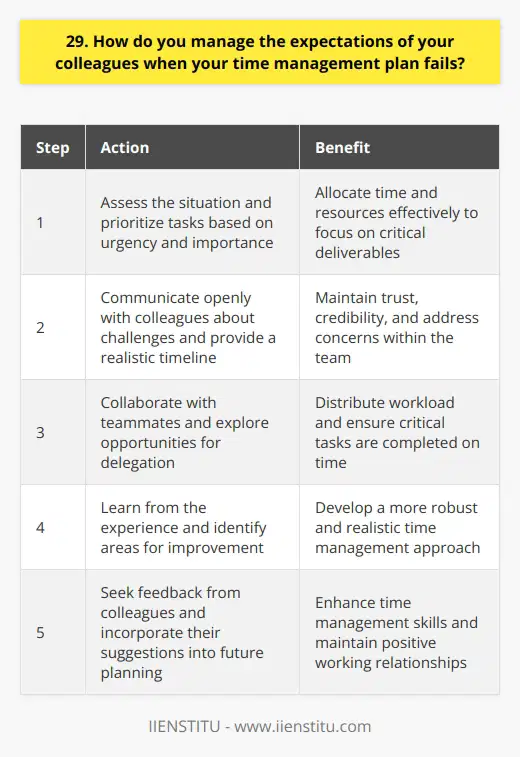
30. What role does continuous improvement play in your approach to time management and recovery?
Continuous improvement is a fundamental part of my approach to time management and recovery. I firmly believe that there is always room for growth and development, no matter how efficient or effective I may be at any given moment.
Reflecting on Past Experiences
When I think back to my early days in the workforce, I remember struggling to juggle multiple tasks and deadlines. It was overwhelming at times, but through trial and error, I gradually discovered strategies that worked for me. I learned the importance of prioritizing tasks, breaking large projects into manageable chunks, and using tools like calendars and to-do lists to stay organized.
Seeking Feedback and Guidance
One of the key ways I strive for continuous improvement is by actively seeking feedback from my colleagues and supervisors. I value their insights and perspectives, as they often help me identify areas where I can streamline my processes or approach things differently. I also make a point of attending workshops and training sessions whenever possible to learn new skills and stay up-to-date with industry best practices.
Embracing Flexibility and Adaptability
Another crucial aspect of my approach to time management and recovery is maintaining a flexible and adaptable mindset. I understand that unexpected challenges and setbacks are inevitable, and I try not to get too attached to rigid plans or schedules. Instead, I focus on staying nimble and adjusting my strategies as needed to ensure that I can still meet my goals and deadlines.
Prioritizing Self-Care and Balance
Finally, I recognize that effective time management and recovery require a holistic approach that prioritizes self-care and work-life balance. I make a conscious effort to set boundaries, take regular breaks, and engage in activities that help me recharge and refocus. Whether it's going for a quick walk outside, meditating for a few minutes, or chatting with a coworker over coffee, I know that taking care of myself is essential for maintaining peak performance and avoiding burnout.
